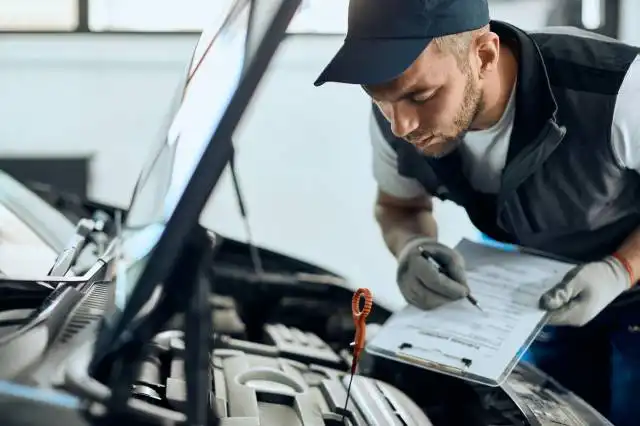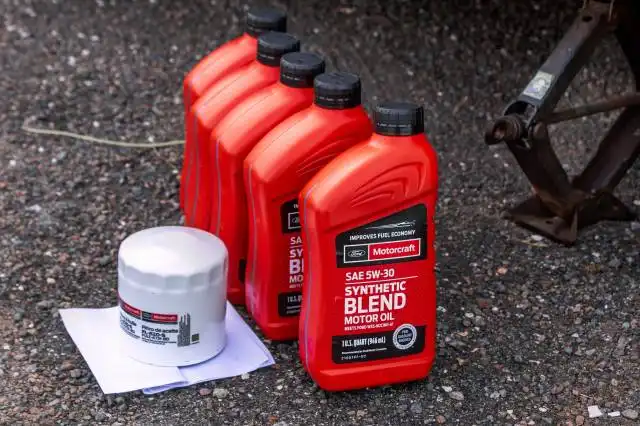Start a Small Engine Repair Business
Humming Engines, Beating Dreams: The Symphony of a Small Engine Repair Business
| Updated


SMALL ENGINE REPAIR BUSINESS
Ever thought of turning your mechanical skills into a viable business? Then, kick start a small engine repair business which primarily fixes and maintains small engines found in lawnmowers, motorcycles, boats and similar equipment. Wave goodbye to your 9-to-5 sludge as there are countless engines out there just waiting for your skilled hands to give them new life. Enjoy the rhythmic hum of a purring engine? Then prepare for the symphony of success, because not only will you enjoy your work, but profit too, given the high demand for this specialized service.
Jump to Business Plan
RELATED BUSINESS IDEAS
Browse ALL Cars & Transportation Solutions Business Ideas
Discover Your Perfect Domain
Unlock the door to your online success with our hand-picked selection of premium domain names. Whether you're starting a new venture or rebranding an existing one, the right domain can set the tone for your digital presence. Browse through our curated list, each with its unique potential to enhance your brand's visibility and credibility.
SMALL ENGINE REPAIR MINI BUSINESS PLAN
This a quick reality check to help you identify the strengths and weaknesses of your business concept before you dive in.
Expected Percent Margin:
- Gross Margin: 40-60%
- Net Profit Margin: 15-20%
Earnings Expectations:
- Daily Earnings: $100 - $400
- Weekly Earnings: $700 - $2,800
- Monthly Earnings: $3,000 - $12,000
- Annual Earnings: $36,000 - $144,000
Actions to Hit Those Numbers:
Investment in Tools and Equipment:
- Initial Investment: Around $10,000-$20,000 for industry-standard repair tools and machinery.
Training and Certifications:
- Professional Credentials: Invest in vocational training and pass relevant certification to increase credibility.
- Skill Updating: Stay updated with modern engine models and their repair techniques.
Marketing and Customer Acquisition:
- Local Advertising: Consider investing in flyers, local newspaper ads, and radio commercials.
- Online Presence: Make sure to have a fully optimized website and social media profiles where prospective customers can easily find and contact you.
Cost Control:
- Shop Rent: Opt for a shop where rent doesn't exceed 10% of total expected monthly sales.
- Management of Parts Inventory: Maintain an effective parts inventory management system to prevent oversupply while keeping necessary parts in stock.
Business Operations:
- Working Hours: Aim to operate 6 days a week, for 8-10 hours a day.
- Jobs Accomplished: Try to complete minimum of 5-10 repairs per day, depending on the complexity of the work.
Please remember that the values in this analysis are estimated and might vary based on location, competition, and specific business conditions. Always get professional advice regarding your particular situation.
NOT WHAT YOU HAD IN MIND? Here are more ideas



Browse ALL Cars & Transportation Solutions Business Ideas
Grab Your Business Website Name
Before you get caught up in the whirlwind of setting up your business, invest in a domain name. It's a small but significant step that lays the foundation for your brand and makes it easier for customers to find and trust you. Just like you wouldn't build a house without securing the land first, don't build a business without securing your domain name.
"Why? Can't that wait?" Here's why it shouldn't
Step 1: Determine if a Small Engine Repair Business is Right for You
Breakdown of Startup Expenses
Before starting a small engine repair business, it is important to understand the startup costs associated with the venture. These costs can include the purchase of tools and equipment, the cost of renting a space, the cost of obtaining any necessary licenses or permits, and the cost of advertising and marketing. Additionally, it is important to consider the cost of any insurance that may be required to operate the business.
Breakdown of Ongoing Expenses
In addition to the startup costs, it is important to consider the ongoing expenses associated with running a small engine repair business. These expenses can include the cost of supplies and materials, the cost of labor, the cost of utilities, and the cost of any necessary repairs or maintenance. Additionally, it is important to consider the cost of any taxes or fees that may be associated with running the business.
Examples of Ways to Make Money
There are a variety of ways to make money with a small engine repair business. These can include charging for labor, charging for parts and supplies, offering maintenance plans, and offering warranties on repairs. Additionally, it may be possible to offer additional services such as pickup and delivery, or offering discounts for repeat customers.
Step 2: Name Your Business
When it comes to naming your business, it is important to think of something that is catchy and memorable. Consider using a play on words, a pun, or a combination of words that will make your business stand out. Additionally, make sure to do a thorough search to ensure that the name you choose is not already taken. It is also important to make sure that the name you choose is not too long or difficult to pronounce. You should also consider registering the name with the state or federal government to protect your business from any potential legal issues.
Registering Your Business
Once you have chosen a name for your business, you will need to register it with the state or federal government. This will help to protect your business from any potential legal issues. Additionally, registering your business will allow you to open a business bank account and apply for a business loan, if necessary. Depending on the type of business you are starting, you may also need to obtain a business license or permit. It is important to research the laws in your area to ensure that you are in compliance with all regulations.
Step 3: Obtain Licenses and Permits
Before starting a small engine repair business, it is important to understand what licenses and permits are necessary. Depending on the state, a business license may be required, as well as a permit for any hazardous materials used in the repair process. Additionally, a seller’s permit may be necessary to collect sales tax. It is important to research the specific requirements for the state in which the business will be located.
Professional Certifications
In addition to the licenses and permits required to operate a small engine repair business, it may be beneficial to obtain professional certifications. This can be done through organizations such as the National Institute for Automotive Service Excellence (ASE). This certification can provide credibility to the business and demonstrate a commitment to quality service. It is important to note that some states may require certifications in order to operate a repair business.
Insurance
Obtaining insurance is an important step in starting a small engine repair business. This will protect the business from any potential liability issues that may arise. Insurance may include general liability, property damage, and worker’s compensation. It is important to research the specific insurance requirements for the state in which the business will be located. Additionally, it may be beneficial to obtain professional liability insurance to protect the business from any potential claims of negligence.
Step 4: Find a Location
When choosing a location for a small engine repair business, it is important to consider the size of the space, the cost of rent, and the availability of parking. It is also important to consider the visibility of the location and the accessibility of the location to potential customers. Additionally, it is important to consider the zoning laws of the area, as some areas may not allow a business of this type.
Benefits of a Home-Based Business
Starting a small engine repair business from home can be a great way to save money on overhead costs. It also allows for a more flexible schedule and the ability to work from anywhere. Additionally, a home-based business allows for more control over the work environment, allowing for a more comfortable and productive work atmosphere. Finally, a home-based business can provide a sense of security and privacy, as the business owner is able to control who has access to their home.
Step 5: Gather Necessary Equipment
In order to start a small engine repair business, you will need to gather the necessary equipment. This list should include tools such as wrenches, screwdrivers, pliers, and other specialty tools. You will also need to purchase a workbench, a tool chest, and other items such as a drill press, a grinder, and a welding machine. Additionally, you will need to purchase a variety of parts for the engines you will be repairing. These parts can include spark plugs, fuel filters, air filters, and other parts that are specific to the type of engine you will be repairing. It is important to research the parts you need and purchase them from a reputable supplier.
Additional Equipment
In addition to the basic tools and parts, you may also need to purchase additional equipment. This could include diagnostic tools, such as a multimeter, a compression tester, and a fuel pressure gauge. You may also need to purchase a lift or a hoist to help you work on larger engines. Additionally, you may need to purchase a shop vacuum to help keep your workspace clean. Finally, you may need to purchase a variety of lubricants, cleaners, and other products to help you maintain the engines you are working on.
Step 6: Develop a Business Plan
Creating a business plan is essential to the success of any small business. A business plan should include the following components:
- Executive Summary: This is a brief overview of the business, its goals, and the strategies that will be used to reach those goals.
- Market Analysis: This section should include an analysis of the target market, a description of the competition, and an explanation of the marketing strategies that will be used to reach potential customers.
- Financial Plan: This section should include a breakdown of startup costs, ongoing expenses, and potential sources of revenue.
- Operations Plan: This section should include a description of the day-to-day operations of the business, including the roles and responsibilities of each employee.
- Management Plan: This section should include a description of the management team and their qualifications.
Writing the Business Plan
Once all of the components of the business plan have been identified, it is time to begin writing the plan. The executive summary should be written first, as it will serve as an introduction to the rest of the plan. The market analysis should be written next, followed by the financial plan, operations plan, and management plan. Each section should be written in a clear and concise manner, and should include any relevant data or research. Once the plan is complete, it should be reviewed by a professional to ensure that all of the information is accurate and up-to-date.
Step 7: Market Your Business
Once you have your business up and running, you will need to start marketing it to potential customers. There are a variety of ways to market a small engine repair business, including online advertising, print advertising, word-of-mouth, and more. Online advertising is a great way to reach a large audience quickly and cost-effectively. You can create ads on social media platforms, search engine platforms, and other websites. Print advertising is also an effective way to reach potential customers. You can place ads in local newspapers, magazines, and other publications. Word-of-mouth is also a great way to market your business. Encourage customers to leave positive reviews on your website or social media pages and ask them to refer your business to their friends and family. You can also offer discounts or special promotions to encourage customers to spread the word about your business.
Step 8: Obtain Necessary Licenses and Permits
Research Local Requirements
Before you can open your small engine repair business, you will need to obtain the necessary licenses and permits. Research the local requirements in your area and make sure you are in compliance with all laws and regulations. Depending on where you live, you may need to obtain a business license, a sales tax permit, a zoning permit, and more. Make sure you are aware of all the requirements and obtain the necessary documents before you open your business.
Step 9: Open Your Business
Create a Grand Opening Event
Once you have all the necessary licenses and permits, you can open your small engine repair business. To draw attention to your business, consider hosting a grand opening event. You can invite local media, potential customers, and other business owners to the event. You can also offer discounts or special promotions to encourage people to come and check out your business. This is a great way to get the word out about your business and attract new customers.
Step 8: Hire Employees
When it comes to hiring employees for a small engine repair business, it is important to consider the skills and experience of the potential employees. It is also important to consider the cost of hiring employees, as well as the cost of training and providing benefits. Additionally, it is important to consider the size of the business and the number of employees needed to run it efficiently.
Finding Qualified Employees
When looking for qualified employees, it is important to look for individuals who have experience in small engine repair. This can be done by searching online job boards and classified ads, as well as networking with other small engine repair businesses. Additionally, it is important to look for individuals who have a good attitude and are willing to learn.
Training Employees
Once qualified employees have been found, it is important to provide them with the necessary training. This can include hands-on training and classroom instruction. Additionally, it is important to provide employees with the necessary tools and safety equipment.
Benefits and Compensation
When it comes to providing benefits and compensation for employees, it is important to consider the cost of providing these benefits and the cost of providing a competitive salary. Additionally, it is important to consider the benefits that employees will receive, such as health insurance, vacation time, and retirement plans. It is also important to consider the cost of providing bonuses and incentives for employees who perform well.
Step 9: Open for Business
Make sure to have all the necessary permits and licenses. Before opening your small engine repair business, it is important to make sure you have all the necessary permits and licenses. Depending on your location, you may need to obtain a business license, a sales tax permit, and other permits related to the type of business you are running. Additionally, you may need to register your business with the state or local government. It is important to research the requirements in your area and make sure you have all the necessary paperwork in order.
Have a plan for marketing and advertising. Once you have all the necessary permits and licenses, it is important to have a plan for marketing and advertising your small engine repair business. This could include creating a website, creating social media accounts, and creating a print advertising campaign. Additionally, you may want to consider joining local business networks and attending trade shows to get the word out about your business.
Have a plan for customer service. It is important to have a plan for customer service when opening your small engine repair business. This could include having a customer service phone line, having a customer service email address, and having a customer service policy. Additionally, you may want to consider having a customer loyalty program to reward customers for their loyalty.
Have a plan for managing finances. When opening your small engine repair business, it is important to have a plan for managing your finances. This could include setting up a business bank account, setting up a budget, and creating a system for tracking income and expenses. Additionally, you may want to consider hiring an accountant to help you with financial planning and tax preparation.
Have a plan for hiring employees. If you plan to hire employees for your small engine repair business, it is important to have a plan for hiring and managing employees. This could include creating job descriptions, setting up a system for interviewing and hiring, and creating a system for training and onboarding new employees. Additionally, you may want to consider creating a system for managing employee performance and creating a system for rewarding employees for their hard work.
EXPLORE MORE CATEGORIES
Browse ALL Business Idea Categories
TAKE THE NEXT STEPS









